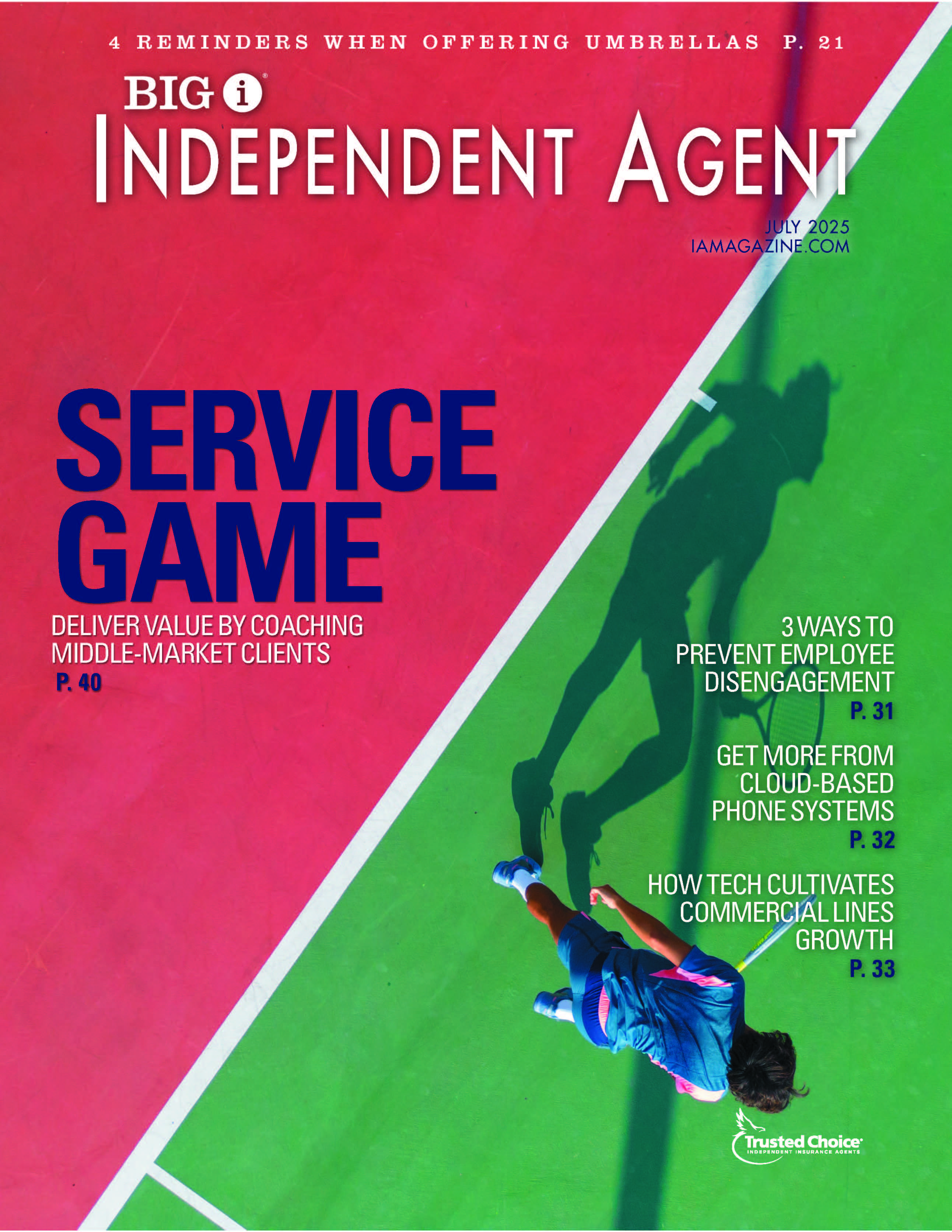The New Face of Independent Agents
By: Banham
Steve Fallon began his career in insurance 22 years ago, overseeing employee benefits at Hamilton Dorsey Alston Company, an Atlanta-based independent insurance agency. About 14 years into his employment, the agency’s principals decided to sell the firm to Wachovia, a bank that, back then, was growing and still financially healthy. Selling to the bank was not an exit strategy for the principals who stayed on, as did Fallon—for a few years, at least.
Eighteen months ago, Fallon did something he had secretly thought about for years—he launched his own independent insurance agency.
“I left Wachovia because I felt the deal had soured over time,” he explains. “The insurance brokerage and consulting business is much more of an entrepreneurial business than banking. They gradually squelched my entrepreneurial spirit, with so many do’s and don’ts that the culture was ruined. I was disheartened and discouraged about where the organization was going, and felt it was time to leave.”
Today, Fallon is president of Fallon Benefits Group, an Atlanta startup focusing on employee benefits. Despite the high risk of failure in all new businesses, Fallon remains undeterred.
“What I love about the insurance business is working with clients to solve their problems,” he says. “To do that meant I had to take a great risk. I walked away from a huge amount of security, and a large book of business that I had built up over 20 years. It was a bold move, but I was resolute.”
Agency Numbers Hold Firm
The intrepid agency principal is not alone in starting an insurance agency, despite the dark economic climate and a soft insurance market. According to findings in the recent Agency Universe study, there is a definable trend toward more agency startups. The biennial survey found an increase in the number of smaller agencies, and an interruption in the trend toward fewer, larger agencies. Overall, the number of independent agencies across the country remains essentially the same as it did in 2006.
While the abatement in the trend toward larger agencies is easily explained by the fact that there are far fewer acquisitions and mergers among larger brokerages and agencies of late, the increase in the number of startups and smaller agencies is surprising. Although the survey was conducted prior to the collapse of the financial system and the bloodletting on Wall Street, starting a new business is always a risky endeavor, particularly when the insurance market is as soft as it has been these last few years. Given the financial cost of leasing a building, investing in technology and securing contracts with carriers in the highly competitive insurance market, the prospect of failure is unnerving to most.
And yet the numbers don’t lie. The Agency Universe study indicates that the proportion of small agencies (determined by annual insurance revenues) increased from 12% to 17% of total agencies between 2006 and2008. According to the study, there are approximately37,500 independent insurance agencies in the U.S., roughly the same number posted in the 2006 study. Of the agencies participating in the recent survey, 11% are considered “relatively new”—with 4% founded in 2007or 2008, and the remainder incorporated since 2004.
There are several hypotheses for the phenomenon, but one looms largest. As Madelyn Flannagan, Big “I” vice president of education and research, puts it, “This is still seen as a very viable business. Obviously, many entrepreneurs out there still see the independent agency system as an industry of opportunity. They perceive value in providing close interactions with consumers and businesses, and in offering them the advantages of(insurer and insurance product) choice. The study tells me that this remains a very resilient profession, in good economic times or bad.”
Digging into the Details
The survey findings about the increases in small agencies and startups have many fathers. Some startup agencies have been inaugurated by people like Fallon, whose previous agency was snapped up in the banking industry’s move into the insurance business. Others were launched by principals or producers at an agency that subsequently was acquired by a much larger agency—the trend of the last five to six years that now seems to have stabilized. As these larger entities gorged on each other, creating behemoth brokerage organizations, some felt left out. “There are always people who don’t like being part of a bigger group; they prefer to be independent and in a small operation,” says Shirley Lukens, senior vice president at Reagan Consulting, an Atlanta based management consulting firm. “Many seek to buy their book of business, and then spin off and start their own operations.”
This is especially true once a former principal’s non-compete agreement with the new owner expires or when contracts requiring the principal and/or producers to stay on at the organization to ensure its continued success elapse. “Many times when people are free to stay or go, they often choose to go,” Lukens says.
Certainly, this was the case for Fallon. Although he had signed a non-solicitation agreement with Wachovia, meaning he was prohibited from contacting his former clients for business, he no longer was bound by a non-compete contract. “I went down to the bank’s headquarters in Charlotte, N.C., and met with the president of Wachovia Insurance Services to tell him that I was leaving and planned to compete against the bank,” he says. “He asked me to stay on for 30 days to transition the accounts, which I did.”
Although he could not solicit business from his former clients, Fallon was permitted to contact them and tell them that he was leaving Wachovia to start his own insurance agency. Many soon made the decision to follow him. “It made launching the agency a lot easier,” he says. “I knew there would be a ramp-up period for a time and I wouldn’t make a profit the first year, but having loyal clients stepping out with me, including some large public companies, was a relief. I knew in the end it wasn’t the name on the door—Wachovia—that brought them into the fold, it was me, the trusted advisor doing the work that they had come to rely on.”
Wide Open Spaces
Another factor spurring an increase in agency startups is the desertion by some direct writers and captive insurance companies of challenging geographic markets like the southeastern United States. Former agents of the carriers, suddenly left without employment, are starting up their own independent agencies. “We’ve seen an increase in the number of startup agencies by people who previously were employed by the direct writers or captive companies, and have now become independents,” says Bob Pettinicchi, executive vice president at InsurBanc, the bank founded by the Big “I” to assist members financially in their growth strategies.
Like others, Pettinicchi believes the increase in the number of startups has less to do with individuals entering the insurance business for the first time and far more to do with disgruntled, longtime professionals seeking to make their own way. “Many new agencies are splitting off from banks or larger agencies and direct writers, acquiring their books of business and putting their names on the door,” he says.
All Roads Converge
While the emergence of clusters, networks, franchises and their kin are a factor in the rise in startup and smaller agencies, the collapse of a network also seems to be spurring the trend. When Brooke Corp., a Kansas City-based franchise, filed for Chapter 11 bankruptcy protection in October, many of its 250 franchisees were not surprised—they reportedly had complained for months about not receiving their commissions. At one time, Brooke listed about 900 franchisees and company-owned locations around the country. Several former franchisees are now said to be launching their own insurance agencies.
Such is the case in Oklahoma, where several agents have contacted the state association to secure errors and omissions liability insurance for their planned startups.“They told us that Brooke hadn’t been paying them commissions since August, and they were hurting and wanting to be independent, but needed the E&O, which is difficult for some given their lack of (loss) experience,” says Lyra Roberts, E&O program manager at the Independent Insurance Agents of Oklahoma. “Nevertheless, we’ve been fairly successful helping most of them. We’ve quoted about 10agents, and half are now moving to startup their own businesses.”
Among them is T.K. Hendrickson, president of newly minted Safeguard Insurance, an agency in Norman, Okla. Hendrickson had joined Brooke in June 2006, having previously worked as a producer for a captive commercial lines insurer. He soon regretted leaving. “Within three months of joining the network, I felt that the fee was paying for the service I was getting was not justified,” he says. “I planned to get out of my contract and start up my own agency, but then they announced the bankruptcy and made the decision easier. Frankly, when I heard (about the filing) I was happy and relieved.”
While securing his release from Brooke to transition his book of business to the new agency, Hendrickson obtained appointments with several carriers, a process she says was less difficult than he had imagined. Although he had access to about20 markets at Brooke, he has fewer today but still enough to provide a range of product choices and related coverages and costs to customers. “Some said ‘yes’ and some said ‘no’, but the latter weren’t doing much business with me anyway, which might explain the ‘no’,” he says.
The agency is in the same building as before, although the sign out front now reads Safeguard Insurance. How does Hendrickson like being his own boss? “I love being independent,” he says. “Back when I was a captive agent, I hated it when I had to tell a key client that rates had shot up 20% and there was nothing I could do about it. Now if one carrier’s rate is 20%higher I always have others I can go to for a more competitive premium.”
Banham (Russ@RussBanham.com) is an IA senior contributing writer.
An Opportunity to Capitalize
A market like southern Florida, where competition has dwindled in the wake of several disastrous hurricanes, may scare off some direct writers and captive companies, but to entrepreneurs with gumption and grit the state is perceived as a ripe opportunity. Brightway Insurance, for example, found a way for small independent agencies to penetrate the market with a wide variety of insurance offerings. In the past five years, Brightway has grown from a single office with three people to having 38 offices in the state, each of them a startup agency. “As the direct writers retreated, a vacuum opened,” comments David Miller, president and CEO of Jacksonville-based Brightway.
That vacuum is quickly being filled by Brightway agencies. The organization is not a network, franchise or cluster, although there are similarities to this newer form of agency operations.“I think of us as a personal and commercial lines insurance retailer,” Miller says. “We create a way for entrepreneurs to run their own small insurance agencies, yet have access to more product options and carriers, in addition to having their business serviced in one centralized place by our service center.”
Brightway “acts like a direct writer, in that we own the business, although we share pieces of the revenue with the agencies,” he adds. “The main difference is that we represent several insurance markets, pretty much all the major nationals and regionals in the state, and not just a single carrier. We also have the latest and best technology to offer the startups, a paperless environment to do quoting, rating, binding and so on, seamlessly linking them and their customers to our call center. And we have common branding and marketing.”
—R.B.









